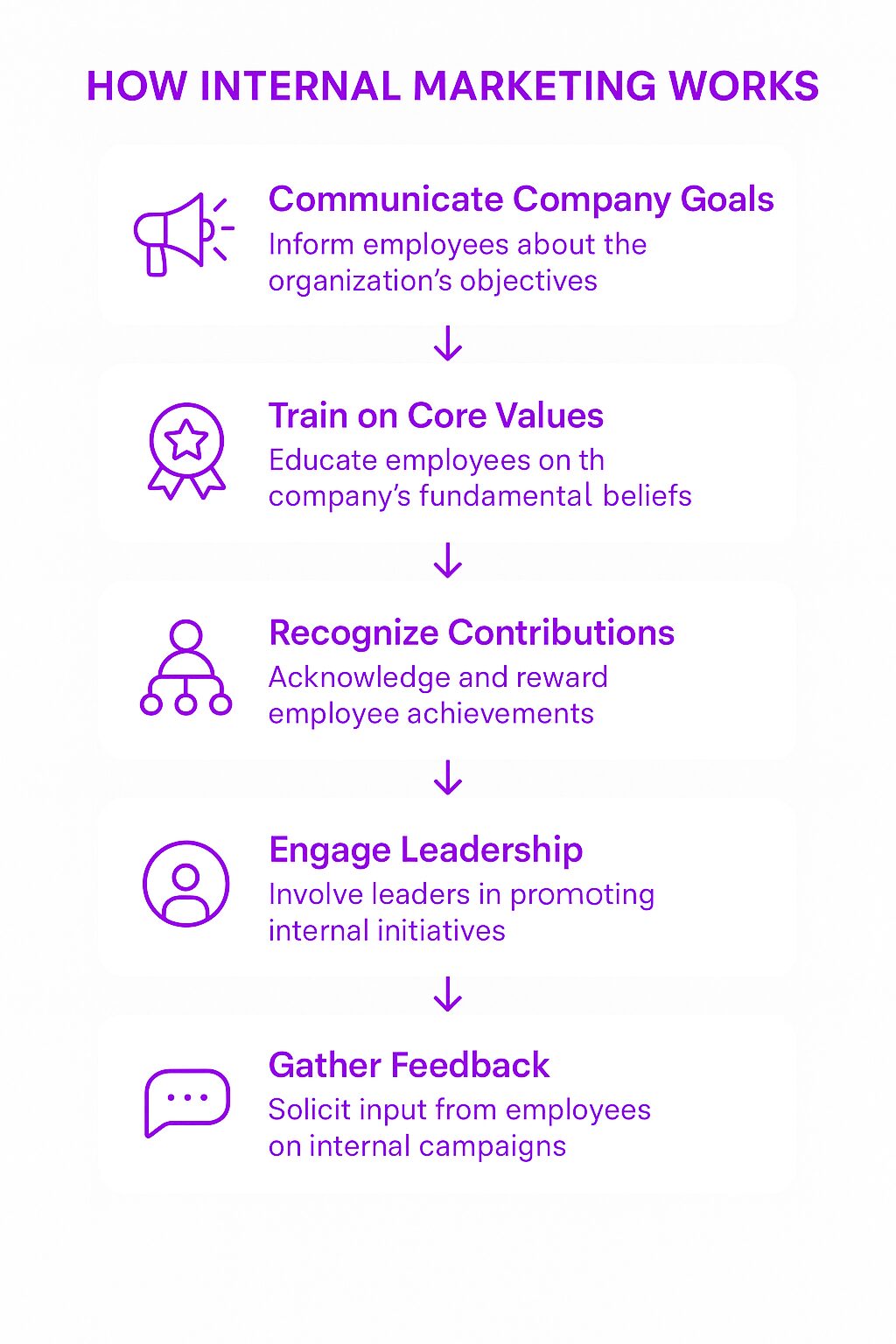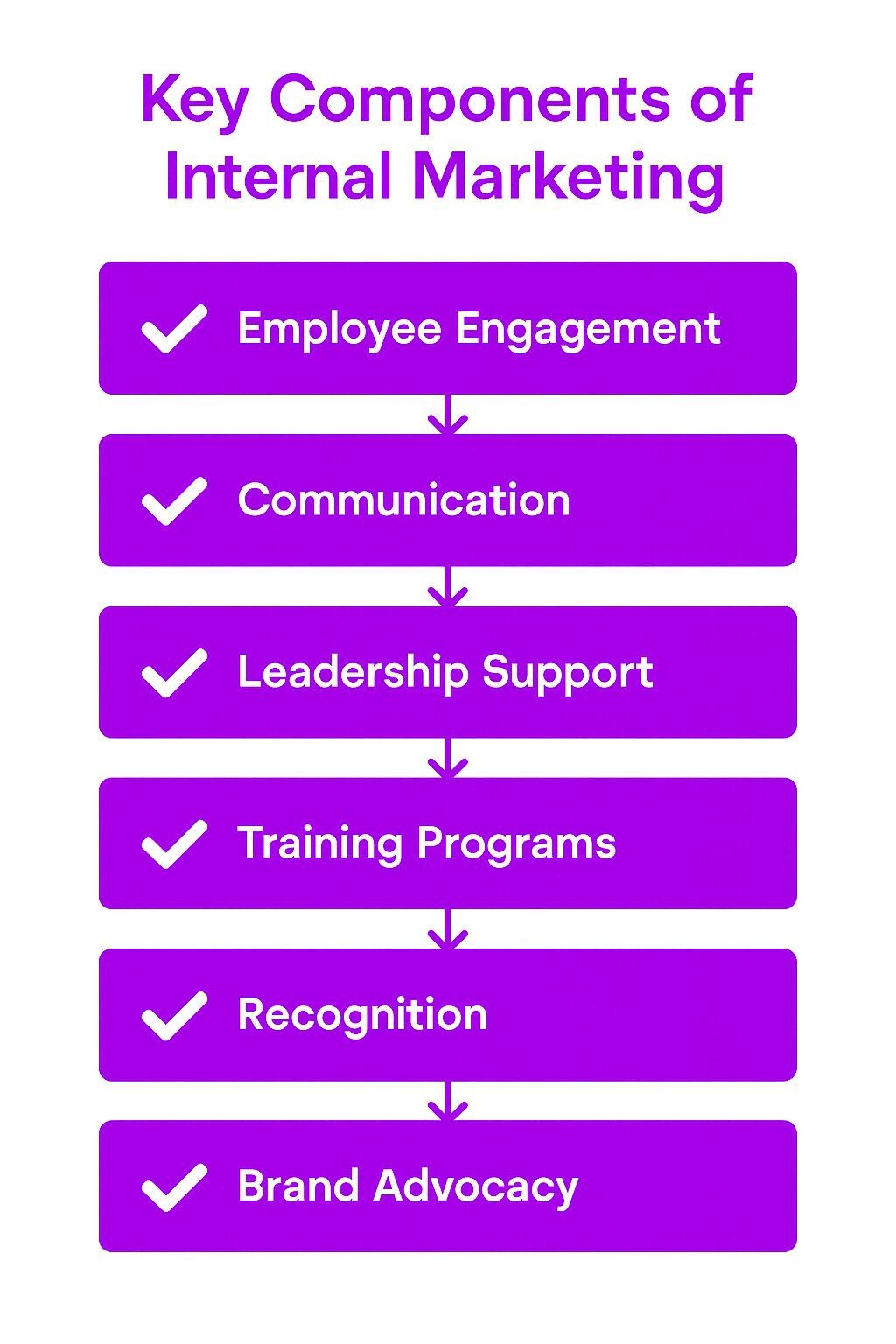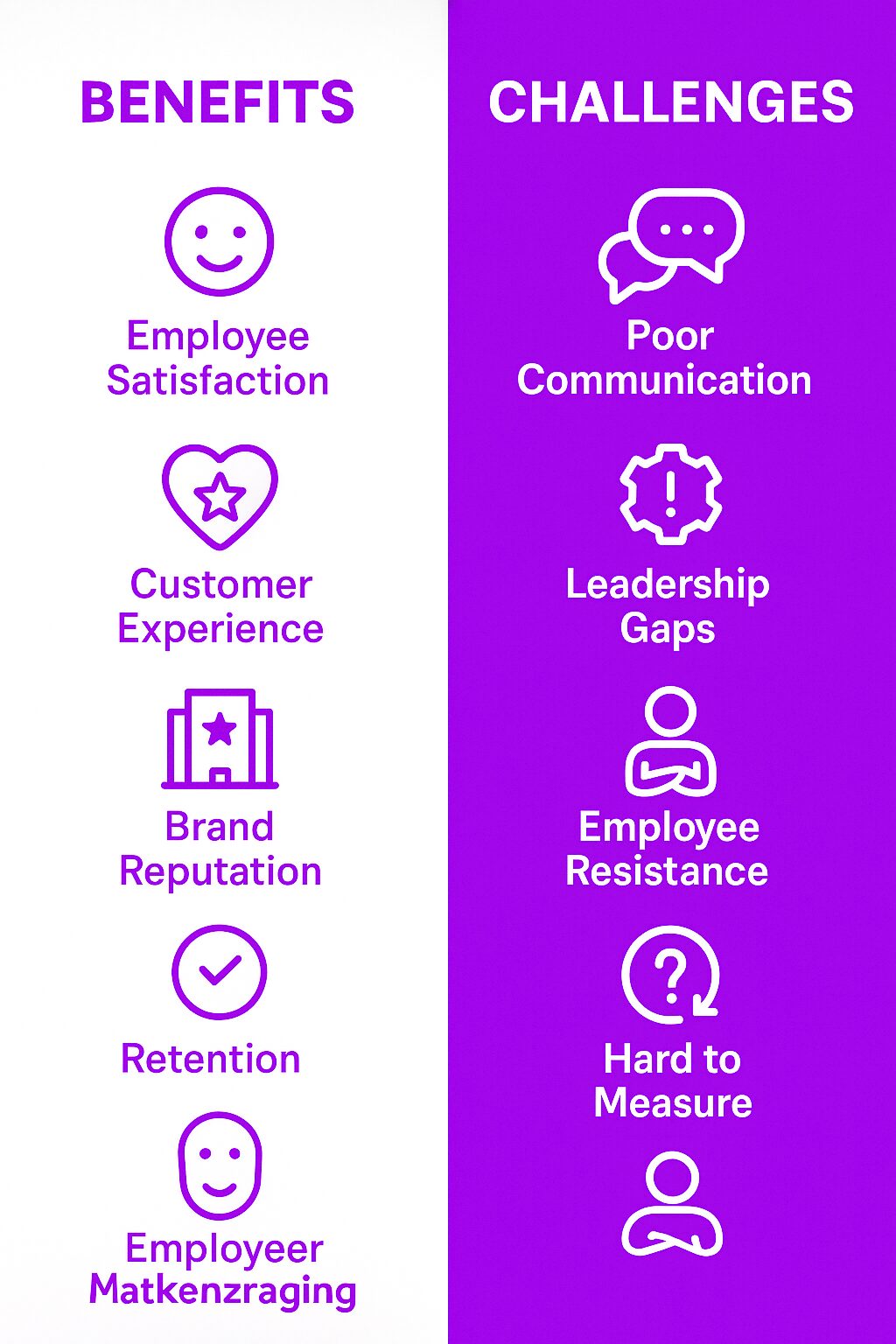What Is Internal Marketing?
Internal marketing is the process of promoting a company’s brand, culture, values, and company’s mission to its employees. It ensures that employees understand and believe in the company’s mission, making them more engaged, productive, and aligned with business objectives through effective communication. Instead of focusing on external customers, internal marketing treats employees as an internal audience, building their commitment to the organization.
Companies that implement strong internal marketing strategies create a workplace where employees feel valued and motivated. They become brand ambassadors, positively influencing customer interactions and external reputation.
How Internal Marketing Works
Internal marketing involves a combination of communication strategies, training programs, leadership involvement, and employee engagement initiatives. Internal marketing communication is crucial as it engages employees with the organization’s goals, values, and initiatives, driving business success and fostering a positive company culture. It aligns employees with business goals and creates a sense of purpose in their work.
It requires a structured approach that includes:
-
Clear communication about company goals and expectations.
-
Training programs that reinforce company values.
-
Employee recognition programs that reward commitment and achievement.
-
Leadership that actively promotes a positive work environment.
-
Platforms for employees to share feedback and ideas.
Why Internal Marketing Matters
When employees believe in the company’s mission, an effective internal marketing strategy ensures they are more likely to be engaged, stay with the company longer, and provide better customer service. Internal marketing plays a crucial role in:
-
Building Employee Engagement – Employees who understand and support their company’s values are more motivated.
-
Improving Retention Rates – A positive work environment reduces turnover.
-
Strengthening Brand Advocacy – Employees who believe in the brand communicate that enthusiasm to customers.
-
Enhancing Communication – A well-informed workforce operates more effectively and collaboratively.
-
Increasing Productivity – Engaged employees contribute more to the company’s success.
Developing an Internal Marketing Strategy
Developing an internal marketing strategy is crucial for businesses to effectively communicate with their employees and promote their brand and mission. A well-planned internal marketing strategy can help engage employees, increase employee retention, and drive business success. Here are some key steps to develop an internal marketing strategy:
-
Define Your Goals: Identify what you want to achieve through your internal marketing efforts. This could be increasing employee engagement, improving employee retention, or promoting your company’s mission and values.
-
Know Your Audience: Understand your employees’ needs, interests, and preferences. This will help you create content and messaging that resonates with them.
-
Conduct a Competitor Analysis: Research your competitors’ internal marketing strategies to identify best practices and areas for differentiation.
-
Develop a Content Strategy: Create a content plan that includes a mix of internal communications, employee engagement initiatives, and marketing campaigns.
-
Choose Your Channels: Select the most effective channels to reach your employees, such as email, intranet, social media, or internal newsletters.
-
Measure and Evaluate: Track the success of your internal marketing strategy and make adjustments as needed. Use metrics like employee feedback, engagement levels, and retention rates to gauge effectiveness.
By following these steps, you can create an internal marketing strategy that aligns with your business goals and fosters a motivated, engaged workforce.
Implementing Internal Marketing Programs
Implementing internal marketing programs can help businesses achieve their internal marketing goals and objectives. Here are some effective internal marketing programs to consider:
-
Employee Advocacy Programs: Encourage employees to share company news and updates on social media to increase brand awareness and reach. This not only amplifies your external marketing efforts but also makes employees feel like integral parts of the company’s mission.
-
Internal Communications Campaigns: Launch internal communications campaigns to promote company news, updates, and initiatives. Use a variety of channels to ensure that all employees are informed and engaged.
-
Employee Engagement Initiatives: Develop employee engagement initiatives, such as recognition programs, employee feedback mechanisms, and team-building activities. These programs help to create a positive work environment and foster a sense of community.
-
Training and Development Programs: Offer training and development programs to help employees develop new skills and advance in their careers. This investment in employee growth can lead to higher retention rates and a more skilled workforce.
-
Internal Marketing Events: Host internal marketing events, such as town hall meetings, product launches, and company-wide celebrations. These events can boost morale and reinforce the company’s values and mission.
By implementing these internal marketing programs, businesses can create a more engaged and motivated workforce, leading to better overall performance.
Key Components of Internal Marketing
Employee Engagement
Engaged employees who understand and identify with the company’s vision are more likely to contribute to company goals and remain committed to their work. Internal marketing fosters engagement by reinforcing a company’s mission and recognizing employee contributions.
Internal Communication
Transparent and consistent internal marketing communication ensures that employees stay informed about company changes, goals, and expectations. Internal marketing relies on emails, newsletters, meetings, and digital communication tools to distribute information effectively.
Leadership and Management Support
Leaders set the tone for company culture. An internal marketing team plays a crucial role in executing marketing plans and influencing employee engagement and company philosophy. When executives actively support internal marketing initiatives, employees are more likely to buy into the company’s vision and goals.
Training and Development
Investing in employee growth strengthens their connection to the company. Training programs that align with business goals help employees see how their roles contribute to the organization’s success.
Recognition and Rewards
Acknowledging employees’ efforts increases morale and motivation. Internal marketing includes recognition programs that celebrate achievements and reinforce positive behaviors.
Internal Brand Advocacy
Employees who believe in their company’s mission naturally become brand advocates by being treated as internal customers. Internal marketing turns employees into ambassadors who share the company’s values with customers and external audiences.
Benefits of Internal Marketing
Higher Employee Satisfaction
When employees feel valued and informed, job satisfaction increases. A strong internal marketing strategy, which is a key component of successful internal marketing, ensures that employees feel like an integral part of the company’s success.
Improved Customer Experience
Happy and engaged employees, driven by effective external and internal marketing, provide better service. Customers interact with employees who believe in the company’s values and are motivated to provide the best experience.
Stronger Team Collaboration
Internal marketing fosters a sense of unity among employees. A shared understanding of company goals leads to better teamwork and cooperation.
Increased Retention and Reduced Turnover
Employees who feel connected to their company’s mission are less likely to leave. This reduces hiring costs and strengthens institutional knowledge.
Enhanced Company Reputation
A company with engaged employees builds a strong employer brand. Satisfied employees speak positively about their company, attracting top talent.
Challenges of Internal Marketing
Lack of Leadership Buy-In
If executives and managers do not actively support internal marketing efforts, employees may view initiatives as insincere or unimportant.
Poor Communication
Inconsistent messaging or unclear communication channels lead to confusion and disengagement. Companies must ensure that information is distributed effectively across all levels.
Employee Resistance to Change
Some employees may be skeptical about internal marketing initiatives. Overcoming resistance requires transparency and continuous engagement.
Measuring Impact
Unlike external marketing, internal marketing success is harder to quantify. Companies must use employee surveys, retention rates, and engagement metrics to assess effectiveness.
Best Practices for Internal Marketing
Establish Clear Communication Channels
Use emails, meetings, intranet platforms, and digital communication tools to ensure employees receive important updates in a timely manner.
Encourage Leadership Involvement
Executives, managers, and the marketing team should actively promote internal marketing initiatives. Their participation reinforces the company’s commitment to employees.
Recognize and Reward Employees
Marketing teams, along with internal communicators and HR, play a crucial role in public recognition, bonuses, and career advancement opportunities to encourage employees to stay engaged and aligned with company goals.
Provide Training and Development Opportunities
Offering professional growth programs helps employees see a future within the company, increasing long-term commitment.
Gather and Act on Employee Feedback
Companies should regularly collect employee input through surveys and discussions. Acting on feedback demonstrates that leadership values employees’ perspectives.
Promote a Strong Workplace Culture
A positive work environment fosters engagement. Companies should reinforce their values through cultural initiatives and team-building activities.
Use Technology to Enhance Engagement
Modern intranet systems, employee engagement apps, and collaboration tools improve information sharing and engagement.
The Role of Internal Marketing in Business Success
Internal marketing plays a critical role in business success by promoting employee engagement, driving business results, and enhancing the customer experience. Here are some ways internal marketing contributes to business success:
-
Employee Engagement: Internal marketing helps engage employees and increase their motivation and productivity. Engaged employees are more likely to be committed to their work and aligned with the company’s goals.
-
Business Results: Internal marketing drives business results by promoting company initiatives, products, and services. When employees are well-informed and motivated, they can better contribute to the company’s success.
-
Customer Experience: Internal marketing enhances the customer experience by ensuring that employees understand and can communicate the company’s value proposition. Engaged employees are more likely to provide exceptional service, leading to higher customer satisfaction.
-
Brand Reputation: Internal marketing helps build a strong brand reputation by promoting the company’s mission, values, and culture. Employees who believe in the company’s vision become brand advocates, positively influencing external perceptions.
-
Competitive Advantage: Internal marketing provides a competitive advantage by differentiating the company from its competitors and attracting top talent. A strong internal marketing strategy can make a company more appealing to potential employees and customers alike.
By developing an internal marketing strategy, implementing internal marketing programs, and understanding the role of internal marketing in business success, businesses can effectively promote their brand and mission, engage their employees, and drive business results.
Related Concepts
Employee Advocacy
Encouraging employees to promote the company’s mission externally strengthens brand reputation and credibility.
Employer Branding
A strong internal marketing strategy enhances how a company is perceived by potential job candidates and customers.
Internal Communications
Clear, consistent messaging ensures that employees remain informed and engaged with company initiatives.
Organizational Culture
Internal marketing plays a role in shaping company culture, reinforcing values, and fostering a sense of community.
Real-World Examples of Internal Marketing Success
Lozier Corporation’s Employee Engagement Strategy
Lozier Corporation launched an internal communication platform to connect employees across locations. The initiative increased engagement, with employees publishing over 900 articles and generating 210,000 content views within a year.
Google’s Employee-Centric Culture
Google invests heavily in internal marketing through employee benefits, flexible work policies, and professional development programs. These efforts contribute to high engagement and job satisfaction.
Zappos’ Customer Service Philosophy
Zappos trains employees to embody the company’s values, reinforcing a customer-first mindset. The company’s internal marketing efforts have led to exceptional customer experiences and strong brand advocacy.
Final Thoughts
Internal marketing is essential for creating an engaged workforce, improving employee satisfaction, and strengthening a company’s brand. When employees believe in their company’s mission and values, they contribute more effectively to business success. Organizations that invest in internal marketing create a workplace where employees feel valued, motivated, and aligned with corporate goals.







